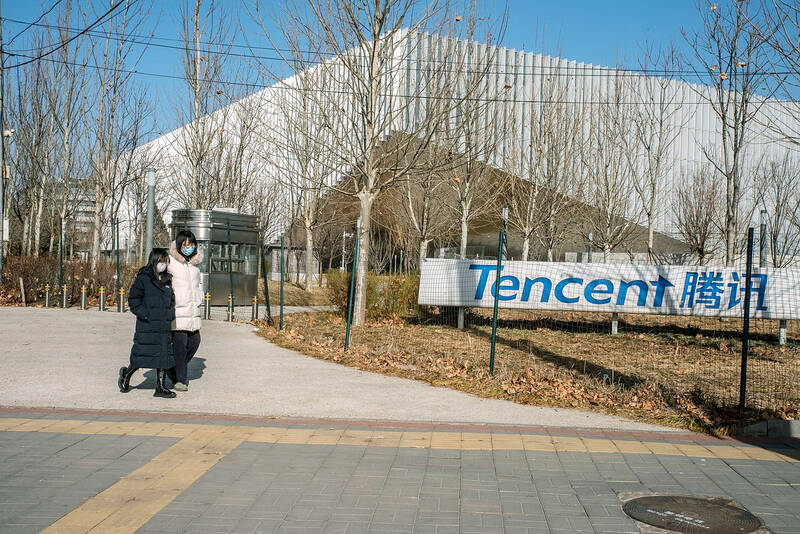Tencent Holdings Ltd (騰訊) is planning to launch a Valorant e-sports league when the hit shooter title debuts in China this year, one of the strongest signs yet that the country’s Internet giants are getting back to business after a two-year industry crackdown.
Tencent unit TJ Sports has held discussions with top Chinese e-sports players in the past few days about setting up the competition, people familiar with the matter said.
It could launch a tournament over the summer at the earliest, as Tencent rolls out the game domestically, one of the people said, asking not to be identified discussing private information.

Photo: Bloomberg
Talks are in their initial stages and Tencent could push back its timeline, the people said.
However, a Valorant league would help reboot competitive online gaming in China after a two-year lull, when COVID-19 pandemic restrictions and Beijing’s clampdown on youth addiction chilled the world’s largest gaming arena.
Launched globally in 2020, Valorant has grown to become one of the most popular e-sports titles, vying for a multibillion-dollar market along with rival shooters like Blizzard’s Overwatch. Tencent won approval to roll out the title only in December last year, in what investors took as a sign that the government was preparing to relax its grip on the sector.
A Tencent representative said in a message the company was making preparations related to Valorant and had not confirmed a launch date for the game.
A Valorant extravaganza would add to Tencent’s roster of Chinese competitive leagues, spanning genres from battle arenas to racing and first-person shooters.
Tencent set up TJ Sports with US subsidiary Riot Games Inc in 2019 to helm League of Legends contests. Another unit runs tournaments based on Honor of Kings, Tencent’s long-running mobile cash cow.
Valorant, along with the potential e-sports festivities, would help Tencent bolster a business crippled by stricter online content scrutiny. Growth for the WeChat operator has all but evaporated since 2021, when regulators began to establish curbs on everything from gaming time to undesirable content.
In December, the Chinese social media giant secured a green-light for a clutch of major releases, including Valorant and Pokemon Unite, reinforcing hopes China is easing a two-year crackdown on Big Tech.
Valorant in particular attracted attention because Beijing had in the past signaled its disapproval of violent shooting games with perceived Western cultural overtones. For instance, Tencent was forced to replace PUBG with a less gory alternative named PeaceKeeper Elite that also came with political slogans.
The League of Legends Pro League in China — operated by TJ — is the world’s largest e-sports league in terms of partnered teams and viewership. The Shanghai-based outfit has generated about US$150 million in revenue in its first two years by selling media rights, tickets and merchandise.
Outside China, Riot itself organizes three Valorant international leagues, with a collective 30 teams in places like Los Angeles, Seoul and Berlin.

With an approval rating of just two percent, Peruvian President Dina Boluarte might be the world’s most unpopular leader, according to pollsters. Protests greeted her rise to power 29 months ago, and have marked her entire term — joined by assorted scandals, investigations, controversies and a surge in gang violence. The 63-year-old is the target of a dozen probes, including for her alleged failure to declare gifts of luxury jewels and watches, a scandal inevitably dubbed “Rolexgate.” She is also under the microscope for a two-week undeclared absence for nose surgery — which she insists was medical, not cosmetic — and is

CAUTIOUS RECOVERY: While the manufacturing sector returned to growth amid the US-China trade truce, firms remain wary as uncertainty clouds the outlook, the CIER said The local manufacturing sector returned to expansion last month, as the official purchasing managers’ index (PMI) rose 2.1 points to 51.0, driven by a temporary easing in US-China trade tensions, the Chung-Hua Institution for Economic Research (CIER, 中華經濟研究院) said yesterday. The PMI gauges the health of the manufacturing industry, with readings above 50 indicating expansion and those below 50 signaling contraction. “Firms are not as pessimistic as they were in April, but they remain far from optimistic,” CIER president Lien Hsien-ming (連賢明) said at a news conference. The full impact of US tariff decisions is unlikely to become clear until later this month

GROWING CONCERN: Some senior Trump administration officials opposed the UAE expansion over fears that another TSMC project could jeopardize its US investment Taiwan Semiconductor Manufacturing Co (TSMC, 台積電) is evaluating building an advanced production facility in the United Arab Emirates (UAE) and has discussed the possibility with officials in US President Donald Trump’s administration, people familiar with the matter said, in a potentially major bet on the Middle East that would only come to fruition with Washington’s approval. The company has had multiple meetings in the past few months with US Special Envoy to the Middle East Steve Witkoff and officials from MGX, an influential investment vehicle overseen by the UAE president’s brother, the people said. The conversations are a continuation of talks that

CHIP DUTIES: TSMC said it voiced its concerns to Washington about tariffs, telling the US commerce department that it wants ‘fair treatment’ to protect its competitiveness Taiwan Semiconductor Manufacturing Co (TSMC, 台積電) yesterday reiterated robust business prospects for this year as strong artificial intelligence (AI) chip demand from Nvidia Corp and other customers would absorb the impacts of US tariffs. “The impact of tariffs would be indirect, as the custom tax is the importers’ responsibility, not the exporters,” TSMC chairman and chief executive officer C.C. Wei (魏哲家) said at the chipmaker’s annual shareholders’ meeting in Hsinchu City. TSMC’s business could be affected if people become reluctant to buy electronics due to inflated prices, Wei said. In addition, the chipmaker has voiced its concern to the US Department of Commerce